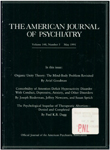Differences between patient and family assessments of depression in Alzheimer's disease
Abstract
A structured interview covering the DSM-III criteria for major depression was adapted for separate use with Alzheimer's disease patients and with their families. Data from 36 patients yielded a depression rate of 13.9%, whereas information from their families indicated that the rate was 50.0%. This disagreement reflected greater family endorsement of patients' loss of interest or pleasure, irritability, fatigue, and feelings of worthlessness. Use of DSM-III-R criteria narrowed but did not eliminate the discrepancy between patients' and families' assessments of the patients' depression. Uniform procedures for gathering and integrating data from the family that are relevant to diagnosis in this group are indicated.
Access content
To read the fulltext, please use one of the options below to sign in or purchase access.- Personal login
- Institutional Login
- Sign in via OpenAthens
- Register for access
-
Please login/register if you wish to pair your device and check access availability.
Not a subscriber?
PsychiatryOnline subscription options offer access to the DSM-5 library, books, journals, CME, and patient resources. This all-in-one virtual library provides psychiatrists and mental health professionals with key resources for diagnosis, treatment, research, and professional development.
Need more help? PsychiatryOnline Customer Service may be reached by emailing [email protected] or by calling 800-368-5777 (in the U.S.) or 703-907-7322 (outside the U.S.).



